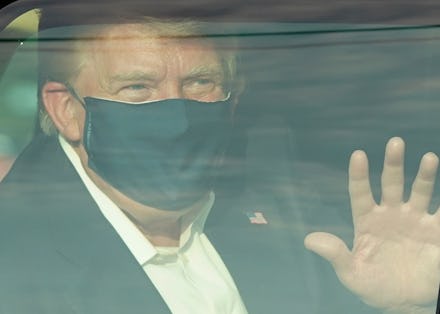Trump's narcissism has never been more glaringly apparent

When someone tells you who they are, believe them. It's one of those mom-approved aphorisms that belies the wisdom beneath it. If someone makes clear over several decades in public life that they are image-obsessed, that they are capable of violence against others, what conclusion may we draw about them? Is it that they are a generally compassionate person capable of empathy, or that they are terminally narcissistic, if not borderline cruel?
Donald Trump told us who he was, over and over again. He told us when he painted all Mexicans as rapists in 2015, when he made misogyny a staple of his campaign in 2016, when he tried to ban Muslims from entering the U.S. in 2017, when he disparaged several African nations as "shithole countries" in 2018, when he proclaimed himself the "chosen one" in 2019, and when he let nearly 210,000 Americans (and counting) die in 2020. His ascent has never been about protecting all Americans, or even most Americans. It's been about protecting Donald Trump, and keeping him and those like him in power.
So when the U.S. was beset by a deadly once-in-a-generation pandemic, it should've come as no surprise that President Trump's first instinct was to downplay it in public, so as not to panic his voters or the precious markets. It makes sense that he turned basic public health guidelines into a partisan issue — that under his watch, care for your fellow humans became sinister virtue-signaling. And it was absolutely inevitable that just when it seemed like the narrative had run its course, that the virus was receding in America after months of agony, the president himself would contract it — and in fact be the host of one of the infamous superspreader events that give illnesses like coronavirus new life.
When Trump tweeted in the early hours of Friday morning that he and first lady Melania Trump had tested positive for coronavirus, it threw the entire American political operation into uncertainty. In the days since, we've learned that even that announcement was belated; that Trump had first tested positive Thursday afternoon, right after returning from an indoor fundraiser at his New Jersey golf course at which few people wore masks, and not early Friday morning as had been implied. We learned that while White House Chief of Staff Mark Meadows was telling the press, on camera and sans mask, that Trump was experiencing "mild symptoms" Friday afternoon, the president was actually in the midst of several alarming drops in his blood oxygen levels and running a high fever. Hours later, he was transported to Walter Reed National Military Medical Center — a seemingly sudden and severe escalation in his care given the administration's insistence the president was in "good spirits."
All the while, the American people received information about the precarious health of their commander in chief via short, written letters from Trump's physician, Dr. Sean Conley, who did not even brief the media in person until Saturday. And after Conley's Saturday briefing, at which the physician proclaimed he was "extremely happy" with the president's progress, the same Mark Meadows who was borderline contemptuous in answering questions about the president's condition Friday was so unmoored by Conley's overly optimistic briefing that he told several White House reporters on background that Trump's condition was "very concerning."
We've since learned the president has taken an experimental antibody cocktail, that he has started a course of remdesivir, that he's been administered a steroid treatment typically reserved for severely ill coronavirus patients. Yet the White House insists he might be ready for discharge as soon as Monday. The White House is well-equipped for medical treatment, but its facilities are not capable of the same rapid and urgent intervention that he could receive at Walter Reed, should his condition worsen.
This is what happens when you elect a vainglorious man for president. He will disregard public health and behave as if the rules of a deadly and highly contagious virus simply do not apply to him and his peers. He will convene dozens of people in close quarters to parade before the public a Supreme Court nominee he has chosen in defiance of the dying wish of a woman who spent 50 years fighting for civil rights. He will create the conditions that allow his staff — both the individuals who have chosen to subscribe to his brand of politics, like his former counselor Kellyanne Conway and White House Press Secretary Kayleigh McEnany, but also those that come with the office, like White House residence staff — to become ill with a deadly affliction. He will so alienate one of the most honor-driven groups in American government, the Secret Service, with his recklessness that agents will tell friends "he's never cared about us."
Then he will ask those same people to pile into a black SUV and drive him around the military hospital to which he's been airlifted, where he's receiving world-class treatment on the taxpayers' dime, so he can wave at adoring supporters. Behind the shield of the car window, he will wear a mask, as will the Secret Service agents made to share close quarters with a confirmed coronavirus patient so he can have another dangerous photo op. A 74-year-old president waving from the backseat of a car tells us nothing about his capacity to operate the American government, nor about his lung functioning or fitness for office. But it does tell us that he really, really wanted to be seen by his fans.
This is the logical course of things. Elevate a man who is obsessed with himself to the highest office in the land, and he will use those vaunted powers to benefit himself. This is what he's always done; this is what he was always going to do. The question now is whether even if Trump himself does recover, will the American democracy be able to do so as well?